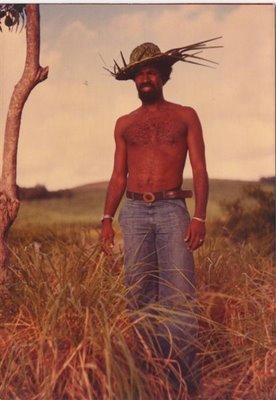
the obligatory "view from my room's window" shot
Visiting my family is always instructive (especially as my sister is just back from Brazil, where, in addition to
attending a baile funk party, she introduced a Rio neighbourhood to a Martiniquan delicacy and had the local version named after her), but all the blog-interesting stuff seemed to happen in the airport.
At the airport, then, a man walked through the crowd with a ladder slung over his shoulder. Classic slapstick scenes played through my head: someone called out to him, he turned, bystanders ducked, then ducked again as he turned back. None of this happened, of course, just as no-one slips on banana peels in real life, but it didn't matter. I laughed on the inside.
On my way back to Brussels, I confirmed once and for all thaat I like girls' drinks.
Jupiler beer's men-targeted advertising (football league sponsorship, "Men know why" slogan) has always turned me off (the Mini's "TESTOSTERONE" ads are even more repellant. Unsurprisingly, it is difficult to find an example of what you are looking for when your search words include mini and testosterone. This
article is close enough.). Less macho approaches appeal more: Hoegaarden Rosée's
"dumb men" jokes scrawled on beer coasters, for example.

In the duty-free, I found the pink bottle pictured above. It stood under a big photo of two women pressed together in a nightclubbish environment that I can only imagine would appeal more to men and lesbians than your average heterosexual girl. I liked the ambiguity and the prospect of a vodka-cognac-rasberry-litchi combination and figured IVN would enjoy the look. I'm not sure what it means to be on the wrong side of the advertising demographic fence.
Okay, some family stuff:

then

now
+
I am reminded of an anecdote I meant to post at the beginning of the year, after my last family visit:
My father spent five weeks working in New York last year. During that time he met up with his old friend Jimmy Owens. When he told me this, I had been listening to the reissue of Mingus's
At UCLA and perked up. "Do you mean
this Jimmy Owens?" (It was an email conversation, I have yet to find a way to hyperlink speech) Granted, this is not of that much interest to you, or even to me. What is of greater interest to me (but perhaps not to you) is that I found out that I had "performed" with Owens once, at some kind of function for UN employees' kids somewhere between the ages of 5 and 8. It's not much (and I can't remember it), but it does put me two degrees away from Mingus and Ellington, among others, and I'll happily accept that.



































